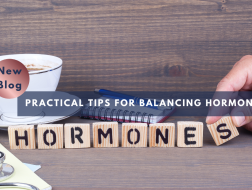Practical Tips For Balancing Your Hormones

Hormones are such a sexy buzzword, but rightfully so. Happy hormones are 100% the name of the game to living our best life.
Nutrition, exercise, and lifestyle all play a role.
And we should always try to balance our hormones through nutritional and lifestyle challenges first. There certainly is an application for hormone replacement therapies, supplements and other medication, but the reality is that many people would not need those if they addressed the root causes first rather than just trying to put a bandaid on the symptoms.
Not sure where to start?
Pick the easiest changes that will elicit the biggest ROI (like sleep) & then keep making little changes when you can.
It all adds up! Here are some practical tips you can start implementing today to help balance your hormones:
SLEEP (THIS IS A GREAT PLACE TO START!)
→ Aim for 7-8 hours of sleep every night.
→ Reduce exposure to electronics, particularly before bedtime (at least 30 minutes prior) and wear blue light blockers.
→ Go to bed at the same time and get up at the same time every day, to optimize your circadian rhythm which will help your sleep quality.
→ Try to get out of shift work if possible.
→ If you are sensitive to caffeine, try to avoid it after 2pm.
→ Vitamin D & Magnesium: Vitamin D deficiency can contribute to poor sleep. Get bloodwork to check levels and try to get 10-20 minutes of sun each day between the hours of 12pm-3pm. Supplementing with magnesium before bed might help you sleep better as well.
NUTRITION
→ Eat at or above maintenance calories for at least ⅔ of the year. This is one of the big reasons why . Long-term low calorie living can lead to unhappy hormones.
→ Eat a diet balanced well in protein, carbs and fats and avoid very low carb or very low fat diets for most of the year.
→ Eating balanced meals that contain a protein, carb and a fat source. (Carbs should be higher than protein for stabilising blood sugar). Also eat at regular intervals.
→ Minimize processed foods. 80-90% of your food should be good quality whole foods.
→ For your fat sources focus on healthy saturated fats such as good quality meats, eggs, butter, coconut oil. Cholesterol from saturated fats are the precursor to hormone production.
STRESS
→ Assessing your stress levels (how is your consumption of alcohol, and food quality, what is your training volume like, job stress, etc).
→ Get rid of unnecessary stressors learn to say ‘no’ to things, delegate tasks, set yourself boundaries (for example no phone time before 7am and after 7pm), surround yourself with positive people and build strong social connections
→ Schedule in down-time, like watching a movie, going out with friends, date night with your partner, a coffee date, social outings like this have shown numerous mental benefits that help bring the sympathetic nervous system, and therefore cortisol, down.
→ Actively practice relaxation techniques like meditation, deep belly breathing, visualization exercises, journaling etc. Find something that you can learn to enjoy, that relaxes you and that works for you!
TRAINING
→ Engage in regular physical activity.
→ Consider why you are training (longevity, aesthetics, performance) and what you really want out of your training. Then adapt your training intensity and frequency accordingly. If you are not going to the CrossFit games any time soon (let's be honest, most people aren't!) and you just want to look good, smashing yourself in the gym 6 days a week may not be the way to go.
→ Periodise your training. You shouldn't be doing high volume AND high intensity together and certainly not all year round. In most cases, resistance training + lower intensity cardio is advisable and more beneficial for hormones.
→ Incidental movement is amazing for your hormones. 8,000 - 10,000 steps a day. The body loves moving! Non-stressful movement like getting more steps can be great for mental health and is helpful for digestion.
ENVIRONMENTAL TOXINS
→ Xenoestrogens are synthetic or natural chemical compounds in our environment that may imitate estrogen-like action in the human body or disrupt our endocrine system. Three major sources (aka the “3 P’s”) include plastics, parabens, and pesticides.
→ Minimize pesticide exposure: The Environmental Working Group’s has a good updated list of the 12 foods that are laden with pesticides and therefore worth buying organic (called ‘the Dirty Dozen ) and also a list of foods that are not worth buying organic (called ‘the EWG Clean 15).
→ Minimize paraben exposure: Skincare, cosmetics, body care products, and hair care products can be toxic to our hormones due to the parabens are present in skin care and cleaning products. Most conventional products DO contain parabens, so it's a good idea to look fro products that state they are paraben free.
→ Minimize plastic exposure: The kitchen is a good place to start. Switch to glass meal prep containers, change to metal drinkware, utilize fabric produce and grocery bags, and ditch plastic dinnerware.
→ Drinking filtered water and installing a filter in your shower head or taps can be another measure to reduce endocrine disrupting chemicals in your environment.
Nevertheless, we do not live in a bubble (and neither should you), so sometimes overthinking these things only adds extra stress. Stick to the basics first and foremost. Get your sleep. Eat good quality whole foods. Get some movement, but not too much - just the right amount and make sure you have strategies in place for managing your stress.
Join the other 10,000+ who get my best fitness, diet & mindset tips.



Comments